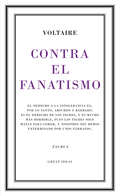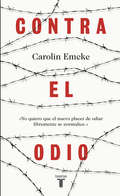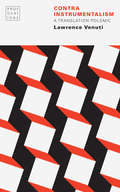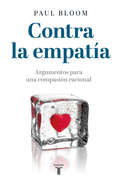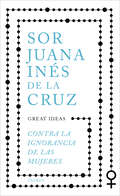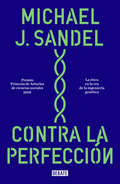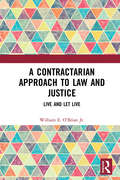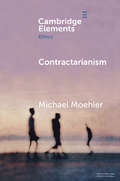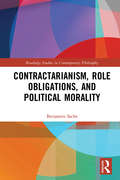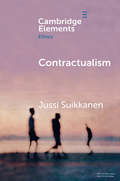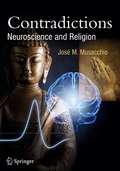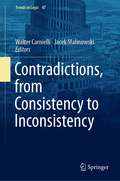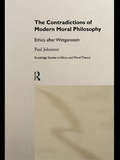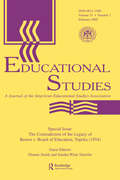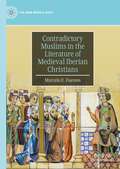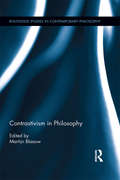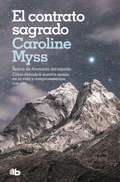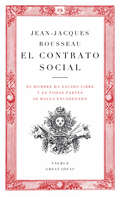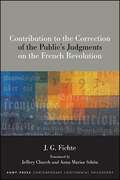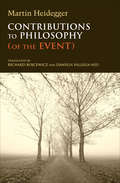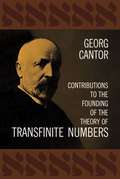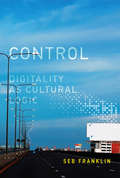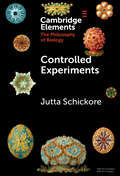- Table View
- List View
Contra el fanatismo religioso (Serie Great Ideas #39)
by Voltaire40 grandes ideas que han cambiado el mundo. Este libro condensa los argumentos clave contra la intolerancia que Voltaire elaboró en su Tratado sobre la tolerancia con motivo del caso Calas. Las razones y conclusiones de Voltaire eran tan válidas entonces como lo son hoy, y la pertinencia de este texto resulta inquietante. A lo largo de la historia, algunos libros han cambiado el mundo. Han transformado la manera en que nos vemos a nosotros mismos y a los demás. Han inspirado el debate, la discordia, la guerra y la revolución. Han iluminado, indignado, provocado y consolado. Han enriquecido vidas, y también las han destruido. Taurus publica las obras de los grandes pensadores, pioneros, radicales y visionarios cuyas ideas sacudieron la civilización y nos impulsaron a ser quienes somos. La crítica ha dicho sobre la colección «Great Ideas»:«Taurus propone un doble envite con este lanzamiento. Por un ladoaumenta su compromiso con el ensayo; por otro, recupera el gusto por la estética. A los volúmenes se les ha proporcionado una portada delicada y cuidada (copian el original británico) que invita a la lectura.»La Razón
Contra el odio: Un alegato en defensa de la pluralidad de pensamiento, la tolerancia y la libertad
by Carolin EmckeEn este contundente y brillante ensayo, la intelectual Carolin Emcke reflexiona acerca de las grandes cuestiones de la actualidad: el fanatismo, el racismo y la creciente desconfianza, por no decir hostilidad, hacia la democracia. Un alegato en defensa de la pluralidad de pensamiento, la tolerancia y la libertad. «El odio solo se combate rechazando su invitación al contagio. Es necesario activar lo que escapa a quienes odian: la observación atenta, la diferenciación constante y el cuestionamiento de uno mismo.»Carolin Emcke Racismo, fanatismo, antidemocracia... en un espacio público cada vez más polarizado se impone un pensamiento que solo permite dudar de las opiniones ajenas, nunca de las propias. A este planteamiento dogmático, Carolin Emcke -premio de la Paz de los libreros alemanes y una de las intelectuales europeas más interesantes de su generación- contrapone un elogio comprometido de lo diverso, de lo «impuro». La respuesta a nuestros problemas actuales no puede quedar relegada sencillamente a los políticos, ya que todos somos responsables de luchar contra todas las formas cotidianas de desprecio y denigración. La democracia solo es posible si tenemos el valor de enfrentarnos al odio. «Emcke demuestra que el diálogo es posible, y su libro nos recuerda que es una tarea que debemos abordar.»Fragmento del fallo del jurado del Premio de la Paz de los libreros alemanes
Contra Instrumentalism: A Translation Polemic (Provocations)
by Lawrence VenutiContra Instrumentalism questions the long-accepted notion that translation reproduces or transfers an invariant contained in or caused by the source text. This “instrumental” model of translation has dominated translation theory and commentary for more than two millennia, and its influence can be seen today in elite and popular cultures, in academic institutions and in publishing, in scholarly monographs and in literary journalism, in the most rarefied theoretical discourses and in the most commonly used clichés.Contra Instrumentalism aims to end the dominance of instrumentalism by showing how it grossly oversimplifies translation practice and fosters an illusion of immediate access to source texts. Lawrence Venuti asserts that all translation is an interpretive act that necessarily entails ethical responsibilities and political commitments. Venuti argues that a hermeneutic model offers a more comprehensive and incisive understanding of translation that enables an appreciation of not only the creative and scholarly aspects of what a translator does but also the crucial role translation plays in the cultural and social institutions that shape human life.
Contra la empatía: Argumentos para una compasión racional
by Paul BloomEn un mundo dividido, la empatía no es la solución: es el problema. Es habitual que pensemos que nuestra capacidad de experimentar el sufrimiento de los otros es una especie de fuente de nuestra bondad; sin embargo, no hay nada más equivocado. Paul Bloom, maestro de la universidad de Yale, revela que la empatía es uno de los principales motores de la inequidad y la inmoralidad en la sociedad. Lejos de ayudarnos a mejorar nuestras relaciones, la empatía es una emoción caprichosa e irracional que apela a nuestros propios prejuicios e, irónicamente, nos lleva con frecuencia a la crueldad. Bloom, basando sus argumentos en investigaciones científicas, ejemplifica que algunas de las peores decisiones tomadas por individuos y naciones -a quién dar dinero, cómo responder al cambio climático, a quién meter en prisión- son impulsadas normalmente por honestas, aunque desviadas, emociones. Con precisión y sabiduría, Contra la empatía evidencia cómo ésta distorsiona todos los aspectos de nuestra vida, desde la filantropía y la caridad, hasta el sistema de justicia; desde la sanidad y la educación, hasta la paternidad y el matrimonio. Sin empatía, insiste Bloom, nuestras decisiones serían más claras, más justas y, sí, más morales. La crítica ha dicho.. #Levante la mano quién de ustedes está en contra de la empatía# ¿Nadie? Paul Bloom admite libremente que estar en contra de ella es lo que la mayoría de las personas debería elegir. El autor argumenta por qué un análisis racional, moral y compasivo son mejores elementos para hacer del mundo un lugar mejor [#]. Para aquellos que deseen entender mejor cómo el corazón y la cabeza batallan por la supremacía y cuál es el órgano que debería regirnos, este libro es un acercamiento contraintuitivo que, además de ser delicioso de leer, es informativo.# Adrian Liang, Amazon Book Review #Refrescante.# Library Journal #Provocador# y poderoso.# Publishers Weekly #Un intrigante contraataque hacia el moderno cinismo psicológico.# Kirkus #Bloom desafía una de nuestras suposiciones más asumidas de qué significa ser bueno. Con humor y elegancia, Bloom revela la debilidad y la falsedad de este supuesto, y nos da una nueva visión de moralidad basada en cómo nuestra mente trabaja.# Carl Zimmer, autor de Evolution: Making Sense of Life #El análisis de Bloom es penetrante, comprensivo y actual. Contra la empatía está destinado a convertirse en un clásico de la psicología.# Michael Shermer, editor de la revista Skeptic, columnista en Scientific American y autor de The Science of Good and Evil.
Contra la ignorancia de las mujeres
by Juana Inés de la CruzDe la pluma de Sor Juana Inés de la Cruz, un extraordinario documento de feminismo avant la lettre que reclama, en el siglo XVII, el acceso de las mujeres al saber. A lo largo de la historia, algunos libros han cambiado el mundo. Han transformado la manera en que nos vemos a nosotros mismos y a los demás. Han inspirado el debate, la discordia, la guerra y la revolución. Han iluminado, indignado, provocado y consolado. Han enriquecido vidas, y también las han destruido. Taurus publica las obras de los grandes pensadores, pioneros, radicales y visionarios cuyas ideas sacudieron la civilización y nos impulsaron a ser quienes somos. Este extraordinario documento de feminismo avant la lettre se compone de dos cartas que reclaman, ya en el siglo XVII, el acceso de las mujeres al saber. Sor Juana, que usó el hábito para acercarse a las letras, escribe con fuerza y encanto, y estos textos, en parte autobiográficos, son de una riqueza impresionante y sorprenden al conectar con muchas de nuestras preocupaciones actuales.
Contra la perfección: La ética en la era de la ingeniería genética
by Michael J. Sandel¿Qué tiene de malo manipular nuestra naturaleza o la de otros seres? El filósofo Michael Sandel trata de responder a esta pregunta a través de un ameno pero profundo repaso del campo de la bioética. Desde hace tiempo es evidente que la ciencia va más deprisa de lo que nuestras intuiciones morales son capaces de asumir: hoy ya es materialmente posible encargar una mascota exactamente igual que la que acabamos de enterrar; o reivindicar que se asegure que nuestros hijos tendrán las mismas determinaciones genéticas que nosotros, incluso cuando consisten en algo como la sordera. La mayoría de las personas se sienten cuando menos incómodas ante algunas de las posibilidades que abre la ingeniería genética, aunque no siempre les resulta fácil explicar por qué. ¿Qué tiene de malo manipular nuestra naturaleza? ¿Dónde están las líneas rojas, si las hay?Contra la perfección explora estos y otros dilemas morales relacionados con la búsqueda de nuestro propio perfeccionamiento. Sandel argumenta que la búsqueda de la perfección es imperfecta por razones que van más allá de la seguridad y de la equidad, y nos lleva más allá de los familiares términos del discurso político para mostrarnos que la revolución genética transformará el modo en que se discute sobre cuestiones éticas y obligará a reintroducir las cuestiones de orden espiritual en el centro del debate político. Para debatir sobre la ética del perfeccionamiento es preciso abordar preguntas que el mundo moderno ha ignorado desde hace décadas, en gran medida porque bordean el terreno tradicional de la teología. Pero nuestros nuevos poderes en el ámbito de la biotecnología hacen inevitables estas preguntas. Abordarlas es la tarea de este libro, escrito por uno de los filósofos políticos más notables de nuestro tiempo.
A Contractarian Approach to Law and Justice: Live and Let Live
by William E. O’Brian Jr.This book presents a distinctive version of a contractarian approach to law and justice. The work argues that law and justice are social norms that arise from a process of social evolution, and are binding only if and to the extent that they are mutually beneficial. It explicitly rejects accounts of law and justice that are based on morality, on the basis that morality itself is only legitimately founded on mutual advantage. But it also rejects most existing versions of contractarianism, which are based on ideas of hypothetical agreements by rational contractors, in favour of an approach that is based on actually existing social norms, but advocates critically examining these norms and discarding those that are not truly mutually beneficial. The first half of the book develops the approach, while the second half explores some of its implications for law. It argues for a left-libertarian approach to property, an approach largely based on the common law of tort, contract and criminal law, and a rejection of most statutory law, which is based not on mutual advantage but rather on benefiting some at the expense of others. However, it ultimately recognises that there are those who want a more extensive state than this approach allows, and advocates a strong form of federalism to allow this, provided robust exit rights are provided. The book combines political philosophy, economics and law into an approach that is broadly libertarian but distinctive in many respects. It will be of interest to scholars in all three of those disciplines.
Contractarianism (Elements in Ethics)
by Michael MoehlerThis Element provides a systematic defense of moral contractarianism as a distinct approach to the social contract. It elucidates, in comparison to moral conventionalism and moral contractualism, the distinct features of moral contractarianism, its scope, and conceptual and practical challenges that concern the relationship between morality and self-interest, the problems of assurance and compliance, rule-following, counterfactualism, and the nexus between morals and politics. It argues that, if appropriately conceived, moral contractarianism is conceptually coherent, empirically sound, and practically relevant, and has much to offer to contemporary moral philosophy.
Contractarianism, Role Obligations, and Political Morality (Routledge Studies in Contemporary Philosophy)
by Benjamin SachsThis book argues that contractarianism is well suited as a political morality and explores the implications of deploying it in this way. It promises to revive contractarianism as a viable political theory, breaking it free from its Rawlsian moorings while taking seriously the long-standing objections to it. It’s natural to think that the state owes things to its people: physical security, public health and sanitation services, and a functioning judiciary, for example. But is there a theory—a political morality—that can explain why this is so and who the state’s people are? This new contractarianism deploys a reversed state of nature thought experiment as the starting point of political theorizing. From this starting point it develops a political morality: a theory of the common ground of the role moralities attached to the various roles within the state. Contractarianism, so understood, can provide a basis for already popular ideas in political theory—such as political and legal liberalism—and overturn conventional wisdom, for example that the state is obligated to secure justice and that animals should have no legal standing. Contractarianism, Role Obligations, and Political Morality will be of interest to scholars and advanced students working in moral and political philosophy.
Contractualism (Elements in Ethics)
by Jussi SuikkanenThis Element begins by describing T.M. Scanlon's contractualism according to which an action is right when it is authorised by the moral principles no one could reasonably reject. This view has argued to have implausible consequences with regards to how different-sized groups, non-human animals, and cognitively limited human beings should be treated. It has also been accused of being theoretically redundant and unable to vindicate the so-called deontic distinctions. I then distinguish between the general contractualist framework and Scanlon's version of contractualism. I explain how the general framework enables us to formulate many other versions of contractualism some of which can already be found in the literature. Understanding contractualism in this new way enables us both to understand the structural similarities and differences between different versions of contractualism and also to see the different objections to contractualism as internal debates about which version of contractualism is correct.
Contradictions: Neuroscience and Religion (Springer Praxis Books)
by José M. Musacchio"Contradictions" is a general interest book that exposes the incompatibility between popular religious beliefs and the scientific view of human nature. It begins with a survey of the evolution of religions and their continuing, often irrational, influences in modern society. Then, based on his long experience in neuroscience, the author takes issue with Decartes about the duality of body and soul. He presents case studies of patients with brain diseases and from these deduces that the soul, far from being separate and supernatural, is no more or less than our way of experiencing our brains ... and which correspondingly disintegrates when they do. Convincing clinical findings and powerful arguments about the universality of truth make this book a bold contribution to the debate about belief and religion in the modern world.
Contradictions, from Consistency to Inconsistency (Trends in Logic #47)
by Walter Carnielli Jacek MalinowskiThis volume investigates what is beyond the Principle of Non-Contradiction. It features 14 papers on the foundations of reasoning, including logical systems and philosophical considerations. Coverage brings together a cluster of issues centered upon the variety of meanings of consistency, contradiction, and related notions. Most of the papers, but not all, are developed around the subtle distinctions between consistency and non-contradiction, as well as among contradiction, inconsistency, and triviality, and concern one of the above mentioned threads of the broadly understood non-contradiction principle and the related principle of explosion. Some others take a perspective that is not too far away from such themes, but with the freedom to tread new paths. Readers should understand the title of this book in a broad way,because it is not so obvious to deal with notions like contradictions, consistency, inconsistency, and triviality. The papers collected here present groundbreaking ideas related to consistency and inconsistency.
The Contradictions of Modern Moral Philosophy: Ethics after Wittgenstein (Routledge Studies in Ethics and Moral Theory #Vol. 1)
by Dr Paul Johnston Paul JohnstonThe Contradictions of Modern Moral Philosophy is a highly original and radical critique of contemporary moral theory. Paul Johnston demonstrates that much recent moral philosophy is confused about the fundamental issue of whether there are correct moral judgements. He shows that the standard modern approaches to ethics cannot justify - or even make much sense of - traditional moral beliefs. Applied rigorously, these approaches suggest that we should reject ethics as a set of outdated and misguided claims. Rather than facing up to this conclusion, most recent moral philosophy consists of attempts to find some ways of preserving moral beliefs. This places a contradiction at the heart of moral philosophy. As a resilt it is often impossible to tell whether a contemporary philosopher ultimately rejects or endorses the idea of objective right and wrong. On the basis of a Wittgenstein approach Paul Johnston puts forward an alternative account of ethics that avoids this contradiction and recognises that the central issues of ethics cannot be resolved by conceptual analysis. He then uses this account to highlight the contradictions of important contemporary moral theorists such as Bernard Williams, Alasdair MacIntyre, Thomas Nagel and Charles Taylor.
The Contradictions of the Legacy of Brown V. Board of Education, Topeka (1954): A Special Issue of Educational Studies
by Dianne Smith Sandra Winn TutwilerOn May 17, 1954, the Supreme Court ruled that separate school facilities were inherently unequal and thus unconstitutional and illegal. Today, 50 years after this landmark decision, much debate surrounds the efficacy of the ruling, particularly for its impact on the education of children of color in U.S. schools. In reality, Brown v. Board of Education of Topeka, Kansas, was never solely about education; neither did the case include only plaintiffs from Topeka. Both points are important to note as we reflect on the legacy of Brown a half century after the ruling. This journal offers articles, an interview, book reviews and a media review around this area.
Contradictory Muslims in the Literature of Medieval Iberian Christians (The New Middle Ages)
by Marcelo E. FuentesThis book argues that literary and historiographical works written by Iberian Christians between the twelfth and sixteenth centuries promoted contradictory representations of Muslims in order to advocate for their colonization through the affirmation of Christian supremacy. Ambivalent depictions of cultural difference are essential for colonizers to promote their own superiority, as explained by postcolonial critics and observed in medieval and early modern texts in Castilian, Catalan, and Portuguese, such as the Cantar de mio Cid, Cantigas de Santa Maria, Llibre dels fets, Estoria de España, Crónica geral de 1344, Tirant lo Blanch, and Os Lusíadas. In all these works, the contradictions of Muslim enemies, allies, and subjects allow Christian leaders to prevail and profit through their opposition and collaboration with them. Such colonial dynamics of simultaneous belligerence and assimilation determined the ways in which Portugal, Spain, and later European powers interacted with non-Christians in Africa, Asia, and even the Americas.
Contrastivism in Philosophy (Routledge Studies in Contemporary Philosophy)
by Martijn BlaauwContrastivism can be applied to a variety of problems within philosophy, and as such, it can be coherently seen as a unified movement. This volume brings together state-of-the-art research on the contrastive treatment of philosophical concepts and questions, including knowledge, belief, free will, moral luck, Bayesian confirmation theory, causation, and explanation.
El contrato sagrado
by Caroline MyssUn proceso sin precedentes para el autodescubrimiento. Una poderosa obra de sabiduría espiritual. Dado que un gran número de personas no acierta a definir cuál es su objetivo en la vida, y que esta inquietud espiritual genera una multitud de malestares y suele derivar en depresión, ansiedad, fatiga y, por último, en dolencias físicas, este libro presente un entretenido e ingenioso proceso que permite a la gente descifrar su contrato, único e intransferible, mediante el uso de una nueva teoría de los arquetipos basada en la obra de Platón, Jung, y diversos pensadores contemporáneos. Este libro constituye una brillante combinación de psicología y revelación espiritual. Con sus anécdotas y estilo característicos, Caroline Myss explica cómo identificar nuestras energías personales y utilizarlas para realizar nuestro potencial máximo, que, en realidad, es nuestro potencial divino.
El contrato social
by Jean Jacques RousseauEL CONTRATO SOCIAL (1762), ES UNA DE LAS OBRAS MÁS IMPORTANTES DEL PENSAMIENTO POLÍTICO. EL RETO QUE EN ESTE LIBRO LANZA SU AUTOR: SU PROPUESTA DE VIVIR EN LA MÁS ESTRICTA IGUALDAD, SIGUE SIENDO UN IMPORTANTE ACICATE PARA TODOS AQUELLOS QUE SE AVENTURAN A CUESTIONAR EL ORDEN POLÍTICO, ENTENDIENDO QUE NO ES ALGO INAMOVIBLE Y DADO PARA SIEMPRE, SINO HUMANO Y POR ELLO PERFECTIBLE, RECUSABLE O PLAUSIBLE.
El contrato social: O Principios Del Derecho Politico (1820) (Serie Great Ideas #Volumen 11)
by Jean-Jacques RousseauIdeas que han cambiado el mundo. A lo largo de la historia, algunos libros han cambiado el mundo. Han transformado la manera en que nos vemos a nosotros mismos y a los demás. Han inspirado el debate, la discordia, la guerra y la revolución. Han iluminado, indignado, provocado y consolado. Han enriquecido vidas, y también las han destruido. Taurus publica las obras de los grandes pensadores, pioneros, radicales y visionarios cuyas ideas sacudieron la civilización y nos impulsaron a ser quienes somos. Este explosivo llamamiento de Rousseau a favor de la libertad humana contribuyó a encender la mecha de la Revolución Francesa y ha avivado desde entonces cualquier debate sobre cómo deberíamos gobernarnos los unos a los otros, siendo considerado tanto un modelo para el terror político como una declaración fundamental de la democracia. Comentarios sobre la colección Great Ideas:«De veras que la edición es primorosa y pocas veces contenido y continente pueden encontrarse mejor ensamblados y unidos. ¡Qué portadas! Para enmarcar. [...] Ante las Great Ideas, solo cabe quitarse el sombrero. ¡Chapeau!»ABC «Taurus propone un doble envite con este lanzamiento. Por un lado aumenta su compromiso con el ensayo; por otro, recupera el gusto por la estética. A los volúmenes se les ha proporcionado una portada delicada y cuidada (copian el original británico) que invita a la lectura.»La Razón «Un fenómeno editorial.»The Guardian «Aparte de los contenidos, en general muy bien elegidos, son tan bonitos que si los ven seguro que cae alguno.»El País «Ideas revolucionarias, crónicas de exploraciones, pensamientos radicales vuelven a la vida en estas cuidadísimas ediciones, muy atractivas para nuevos lectores.»Mujer Hoy «Grandes ideas bien envueltas. De Cicerón a Darwin, esta colección entra por los ojos.»Rolling Stone «Original y bella iniciativa la emprendida por Taurus con su colección Great Ideas.»Cambio 16 «Hay libros inmortales, libros únicos que contienen pensamientos y reflexiones capaces de cambiar el mundo, tesoros en miniatura reagrupados en la colección Great ideas.»Diario de León
Contribution to the Correction of the Public's Judgments on the French Revolution (SUNY series in Contemporary Continental Philosophy)
by J. G. FichteThe reception history of the French Revolution in France and England is well documented among Anglophone scholars; however, the debate over the Revolution in Germany is much less well known. Fichte's Contribution played an important role in this debate. Presented here for the first time in English, Fichte's work provides a distinctive synthesis of Locke's "possessive individualism," Rousseau's general will, and Kant's moral philosophy. This eclectic blend results in an unusual rights theory that at times veers close to a form of anarchism. Written in 1792–93, just before Fichte moved to Jena to develop his philosophical system in a series of works—above all the Wissenschaftslehre of 1794—the Contribution provides invaluable insight into Fichte's early development. In addition, Fichte's work predates much of Kant's political philosophy, and can shed light on the rich dialogue in German political thought in the 1790s.
Contributions to Law, Philosophy and Ecology: Exploring Re-Embodiments (Law, Justice and Ecology)
by Ruth Thomas-Pellicer Vito De Lucia Sian SullivanContributions to Law, Philosophy and Ecology: Exploring Re-Embodiments is a preliminary contribution to the establishment of re-embodiments as a theoretical strand within legal and ecological theory, and philosophy. Re-embodiments are all those contemporary practices and processes that exceed the epistemic horizon of modernity. As such, they offer a plurality of alternative modes of theory and practice that seek to counteract the ecocidal tendencies of the Anthropocene. The collection comprises eleven contributions approaching re-embodiments from a multiplicity of fields, including legal theory, eco-philosophy, eco-feminism and anthropology. The contributions are organized into three parts: ‘Beyond Modernity’, ‘The Sacred Dimension’ and ‘The Legal Dimension’. The collection is opened by a comprehensive introduction that situates re-embodiments in theoretical context. Whilst closely bound with embodiment and new materialist theory, this book contributes a unique voice that echoes diverse political processes contemporaneous to our times. Written in an elegant and accessible language, the book will appeal to undergraduates, postgraduates and established scholars alike seeking to understand and take re-embodiments further, both politically and theoretically.
Contributions to Philosophy: (Of the Event) (Studies in Continental Thought)
by Martin HeideggerHeidegger&’s second magnum opus after Being and Time, laying the groundwork for his later writing, in a translation of &“impeccable clarity and readability&” (Peter Warnek). Martin Heidegger&’s Contributions to Philosophy, written in the late 1930s and published posthumously in 1989, is now widely viewed as his second magnum opus, after Being and Time. Here, Heidegger lays the groundwork for a new conception of thought and being, rooting them both in the event of appropriation. Here, Heidegger establishes the language and intellectual framework necessary for all of his later writings. Contributions was composed as a series of private ponderings that were not originally intended for publication. They are nonlinear and radically at odds with the traditional understanding of thinking. This translation presents Heidegger in plain and straightforward terms, allowing surer access to this new turn in Heidegger&’s conception of being.
Contributions to the Founding of the Theory of Transfinite Numbers (Dover Books on Mathematics)
by Georg CantorOne of the greatest mathematical classics of all time, this work established a new field of mathematics which was to be of incalculable importance in topology, number theory, analysis, theory of functions, etc., as well as in the entire field of modern logic. It is rare that a theory of such fundamental mathematical importance is expressed so simply and clearly: the reader with a good grasp of college mathematics will be able to understand most of the basic ideas and many of the proofs.Cantor first develops the elementary definitions and operations of cardinal and ordinal numbers and analyzes the concepts of "canlinality" and "ordinality." He covers such topics as the addition, multiplication, and exponentiation of cardinal numbers, the smallest transfinite cardinal number, the ordinal types of simply ordered aggregates, operations on ordinal types, the ordinal type of the linear continuum, and others. He then develops a theory of well-ordered aggregates, and investigates the ordinal numbers of well-ordered aggregates and the properties and extent of the transfinite ordinal numbers.An 82-page introduction by the eminent mathematical historian Philip E. B. Jourdain first sketches the background of Cantor's theory, discussing the contributions of such predecessors as Veicrstrass, Cauchy, Dedekind, Dirichlet, Riemann, Fourier, and Hankel; it then traces the development of the theory by summarizing and analyzing Cantor's earlier work. A bibliographical note provides information on further investigations in the theory of transfinite numbers by Frege, Peano, Whitehead, Russell, etc.
Control: Digitality as Cultural Logic (Leonardo)
by Seb FranklinAn examination of digitality not simply as a technical substrate but also as the logical basis for reshaped concepts of labor, subjectivity, and collectivity.Is there a cultural logic of what we have come to call the information age? Have the technologies and techniques centered on the computer provided not only tools but also the metaphors through which we now understand the social and economic formation of our world? In Control, Seb Franklin addresses the conditions of knowledge that make the concept of the “information economy” possible while at the same time obscuring its deleterious effects on material social spaces. In so doing, Franklin traces three intertwined threads: the relationships among information, labor, and social management that emerged in the nineteenth century; the mid-twentieth-century diffusion of computational metaphors; and the appearance of informatic principles in certain contemporary socioeconomic and cultural practices.Drawing on critical theory, media theory, and the history of science, Franklin names control as the episteme grounding late capitalism. Beyond any specific device or set of technically mediated practices, digitality functions within this episteme as the logical basis for reshaped concepts of labor, subjectivity, and collectivity, as well as for the intensification of older modes of exclusion and dispossession. In tracking the pervasiveness of this logical mode into the present, Franklin locates the cultural traces of control across a diverse body of objects and practices, from cybernetics to economic theory and management styles, and from concepts of language and subjectivity to literary texts, films, and video games.
Controlled Experiments (Elements in the Philosophy of Biology)
by Jutta SchickoreControl is a key ingredient of scientific experimentation; arguably, an uncontrolled intervention or manipulation is not even a genuine experiment. Experiments in the life sciences, however, are notoriously difficult to control due to the complexity and variability of living things. This Element discusses general features of controlled experimentation, epistemic and practical aspects, and historical perspectives. It argues that controlled experimentation has a material-technical and a conceptual side. It shifts the focus from control experiments, comparisons with a control, to the broader issue of controlling for background factors as the epistemologically fundamental issue in experimentation. To understand the nature of controlled experimentation, one needs to consider the making – the design phase – of controlled experiments, particularly the conceptualization and treatment of background factors. The making of controlled experiments is at the same time constitutive for the knowledge that can be gained in the experiment, contingent on a research situation, and historically shaped.
